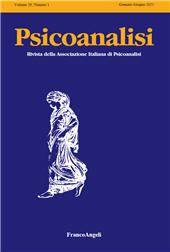Discussione dell'articolo di Laurence Kahn Le deviazioni della libertà
87-94 p.
Il lavoro di Laurence Kahn dimostra che la libertà implica una tensione tra elementi opposti; e che sostenere la libertà, accettando tale tensione, richiede impegno. Due termini tedeschi per libertà Freimachen e Befreien hanno significati diversi. Freimachen (usato in particolare da Joseph Goebbels) significa liberare qualcuno (o qualcosa) per scopi strumentali, mentre Befreien denota un senso di liberazione interiore che regimi totalitari come il nazismo non possono tollerare. Il godimento della libertà dipende dall'accettazione della sua restrizione in determinate circostanze. All'epoca in cui Freud scrisse Mosè e il monoteismo, i nazisti rifiutavano qualsiasi restrizione della loro libertà e, di conseguenza, il progresso stava sprofondando nella barbarie. Laurence Kahn illustra queste problematiche nella situazione clinica. Descrive pazienti che erano autoimprigionati psicologicamente o rifiutavano qualsiasi inibizione dei propri impulsi. Il lavoro analitico li ha aiutati ad
abbandonare posizioni così estreme e a trovare un tipo di libertà più sfumato, che potesse essere più creativo. La distruzione della Frauenkirche durante il bombardamento di Dresda e la sua successiva ricostruzione, nonché il Congresso IPA del 1985 ad Amburgo il primo Congresso IPA tenutosi in Germania dopo la Seconda Guerra Mondiale sono esempi storici straordinari dell'impegno profuso per sostenere la vera libertà. [Testo dell'editore]
Laurence Kahn's paper shows that freedom involves a tension between opposing elements; and that sustaining freedom, by accepting that tension, requires work. Two German words for freedom Freimachen and Befreien have different meanings. Freimachen (used notably by Joseph Goebbels) means freeing somebody (or something) for instrumental purposes, while Befreien denotes a sense of interior liberation which totalitarian regimes like Nazism cannot tolerate. The enjoyment of freedom depends on accepting its restriction in certain circumstances. At the time Freud was writing Moses and Monotheism, the Nazis were refusing any restriction of their freedom, and as a result, progress was collapsing beck into barbarism. Laurence Kahn illustrates these issues in the clinical situation. She describes patients who either imprisoned themselves psychologically, or else refused any inhibition of their impulses. The analytic work helped them to give up such extreme positions, and find a more nuanced kind
of freedom that could be more creative. The destruction of the Frauenkirche in the fire-bombing of Dresden and its eventual rebuilding, and the 1985 IPA Congress in Hamburg the first IPA Congress to be held in Germany since the Second World War are outstanding historical examples of the work involved in sustaining true freedom. [Publisher's text]
-
Articoli dello stesso fascicolo (disponibili singolarmente)
-
Informazioni
Codice DOI: 10.3280/PSI2025-001007
ISSN: 1972-490X
MATERIE
PAROLE CHIAVE
- libertà, nazismo, frauenkirche, congresso di Amburgo
- freedom, nazism, frauenkirche, Hamburg congress


